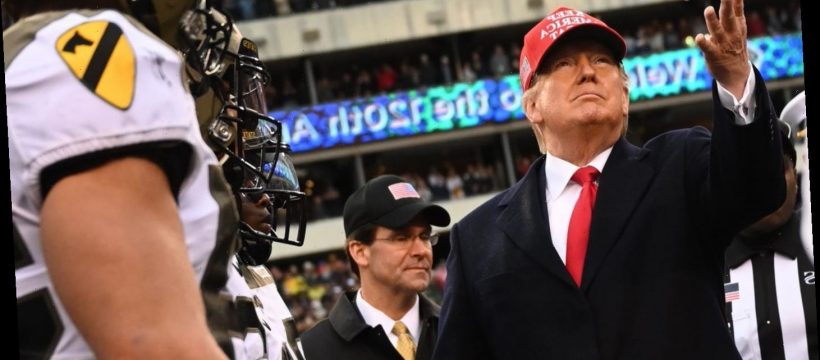President Donald Trump tosses the coin before the Army-Navy game in December. (Photo: ANDREW CABALLERO-REYNOLDS, AFP via Getty Images)
WASHINGTON – Facing intense challenges over Iran and impeachment, President Donald Trump takes time out Monday in a familiar setting: a sports stadium.
Trump flies to New Orleans to attend the college football championship game between Clemson and Louisiana State University, the latest example of efforts to bond with backers and other Americans over a major sporting event.
Since October, Trump has attended a World Series game (where he got booed); a UFC mixed martial arts bout (a mix of cheers and boos); the LSU-Alabama game (cheers); and the traditional Army-Navy game (cheers for the commander in chief).
“It was my Great Honor to attend the 120th Army-Navy game,” Trump tweeted during his Dec. 14 trip.
Two years ago this month, Trump traveled to Atlanta for the college football title game between Alabama and Georgia.
Like many of his predecessors, Trump has used sports events in order to be seen by voters.
Yet this president has been more political with his athletic activity, from attacking professional football players who knelt during the national anthem to protest racism to promoting his November appearance at the LSU-Alabama game during a rally for a governor’s candidate in Louisiana.
Football in particular has long been a “political tool” for Trump, said Erin Tarver, author of “The I in Team: Sports Fandom and the Reproduction of Identity.”
Sports a political tool: Trump attends Alabama-LSU game during Louisiana election. How he, other presidents, use sports for politics
During a 2017 rally in Alabama, at the same time he was excoriating players who knelt during the national anthem, Trump protested new NFL rules that penalized players for hard hits that targeted opponents’ heads. “Today, if you hit too hard, 15 yards, throw him out of the game,” Trump said at one point. “They’re ruining the game, right?”
Tarver, an associate professor of philosophy at Emory University in Atlanta, said all of this points to come “common Trump themes: the desire to be perceived as tough, the assertion of masculinity and a nostalgic view of the past when America was really ‘great.'”
Trump has long shown a preference for football, mostly of the professional variety.
During the 1980s, Trump owned the New Jersey Generals of the old United States Football League (and some blame him for the league’s demise). Before his political career, he reportedly flirted with the idea of buying the NFL’s Buffalo Bills.
In recent weeks, Trump also seems to have amped up his sports commentary in general.
During a string of Sunday tweets, many of them dealing with Iran and impeachment, Trump also found time to praise tennis great Serena Williams for winning the Australian Open – “she is a great player and an even greater person” – and the Tennessee Titans for their NFL playoff upset over the Baltimore Ravens.
“Congratulations to the Great State of Tennessee,” he tweeted. “You’ve got yourselves a fantastic football team.”
Trump heads to the Clemson-LSU game in the wake of a confrontation with Iran, including his decision to authorize the deadly drone strike that killed a top Iranian general.
The president also faces the prospect of a Senate impeachment trial that could start later this month. Trump is accused of abuse of power by asking the nation of Ukraine to investigate a U.S. political rival, Democratic presidential candidate Joe Biden.
Describing impeachment as a politically motivated “hoax,” Trump has sought to rally his political base against the Democrats who are pushing the allegations.
Much of his base is in the South, the heart of college football country. It’s a safe bet that there are a lot of Trump backers in the Clemson and LSU fan bases, and among Southern football fans in general.
“It’s just another way he’s trying to demonstrate that he gets regular people,” said Bruce Haynes, a former Republican campaign consultant (and a big Clemson fan). “It’s his way of saying, I’m not with the elite – ‘I’m with you.'”
Haynes, now a vice chair with the SVC Public Affairs in Washington, D.C., added: “Southern college football is a mix of faith, family and football – with a splash of bourbon on the side.”
Robert Mann, a mass communications professor at LSU, said it seems like Trump “gets a lot of energy from doing this kind of stuff” – and it doesn’t hurt that Monday’s game involves the Trump-friendly states of Louisiana and South Carolina.
“There’s not a lot of risk of going before that crowd and getting booed,” Mann said.
Source: Read Full Article
